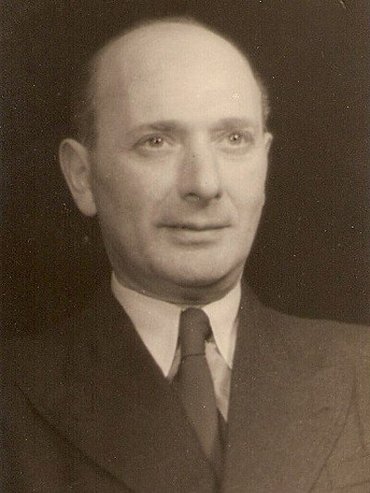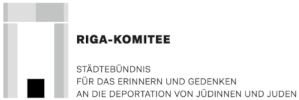A report by Max Schloss
A report by Max Schloss

Max Schloss was born on 29th December 1889 in Ulrichstein in Hesse. He was a war volunteer from 1914 to 1919, as was his brother Hugo. His brother Moritz died on the field of honour for the "grateful German Reich". Max Schloss lived at Markenstrasse 28 in Gelsenkirchen-Horst, where he also had his shop.
On 27th January 1942, he was deported from Gelsenkirchen to Riga together with other family members. From Riga he was sent to the Stutthof concentration camp, and from there via the Buchenwald concentration camp to a subcamp of the Buchenwald concentration camp in Bochum. From there he, together with his son Lutz, managed to escape shortly before the end of the war. Max Schloss emigrated to the USA in 1947.
He never really recovered from the tortures he suffered in camp detention. Max Schloss died in the USA on 2nd January 1955, a few days after his 65th birthday.
„"In 1,000 slaves there are 999 slave owners"“
Kraftwagenwerk (Truck Factory) 9 was also subordinated to the Heeres-Kraftwagenpark (Army Truck Park) 641 of the German Army in the East, Riga, among the many repair shops. This "K-Werk 9" was a branch company of the Automobil-Aktiengesellschaft (Motor Vehicle Company) Haerderich in Duisburg on the Rhine and was in service for the Wehrmacht.
The management of K-Werk 9 was in the hands of NSDAP (Nazi) party comrades Paul Spieker and Kurt Lünenschloss. Spieker and Lünenschloss committed the most sacrilegious acts against the prisoners assigned to them for forced labour at the Kaiserwald concentration camp in Riga (camp commander: SS Sturmbannführer (SS Major) Sauer, formerly of the Sachsenhausen-Oranienburg and Dachau concentration camps).
Unbridled Nazi hatred against the unfortunate enslaved led almost daily to the most severe mistreatment. I myself was an inmate of the Kaiserwald camp and spent every evening with the comrades who worked in K-Werk 9. Thus I directly experienced the hardship of my comrades, which often exceeded my own suffering in its extent. The tortures and humiliations to which they were subjected seemed so commonplace to them that only "special cases" were discussed among themselves i.e., events that in cause and effect surpassed the usual picture of being maltreated....
More than 40 men, who were condemned to hard labour in K-Werk 9, were cruelly put to death with the help of Spieker and Lünenschloss!
Tired of their miserable existence, a number of prisoners escaped from K-Werk 9 in the spring of 1944 in quick succession. For each of the escaped prisoners, the SS led away two, three or more workmates as reprisals.... Those arrested were dragged to the main camp, from where they were transported onward the same day. The destination of the transport was called "the base". Spieker and Lünenschloss, and with them some of the overseers who had caused the measures taken by the SS and who had witnessed the arrest of the poor victims, and in some cases had a hand in their execution, were on the best of terms with the SS leadership.
They used the most trivial incident in everyday life to "report" to the SS leadership, which always prompted the appearance of SS-Hauptscharführer (SS Sergeant Major) Blatterspiel, who was feared by everyone. This man, who personified terror for all, then made the entire work detail of the prisoners stop work and start work, held his foul-mouthed speeches in which threats of death were repeated over and over again, he dictated harsher conditions of existence for everyone each time, and then - then he chose hostages as he "liked" them at that moment....
One day small explosions occurred in a workshop of K-Werk 9. An old carbide container made of sheet metal, such as welders use, burst several times with a loud bang. It was not possible to determine whether these detonations were caused by overpressure or by the carelessness of a worker, but regardless, "the matter had to be reported to the SS...". The explosions caused neither personnel nor material damage, and hardly any significant interruption of work. Nevertheless, Spieker and Lünenschloss deliberately gave the SS an opportunity "to intervene." They constructed a "case" and accused the prisoners of sabotage before the eyes of the SS.
Accompanied by a large number of SS guards, Herr Blatterspiel once again arrived. Trembling all over, nearly 250 slaves lined up before him. Spieker and Lünenschloss are also present... Whom did Blatterspiel like to "select" today?... There are 21 men who are led away under strict guard from the workplace in K-Werk 9 to the main camp, among them some loyal companions who are dear to me....
From the main camp, as I learned for sure, my comrades were transported on to the Kommando "Der Stützpunkt" (The Base Squad). Of the many thousands of inmates of the Kaiserwald concentration camp in Riga, no one knew what the Kommando "Der Stützpunkt" meant. No one knew where this "base" was, but everyone knew that no one returned from there.
But around Riga, not far from the sea, vast, dense forests can be seen. In these forests lie buried the bodies of tens of thousands of Jews who were tortured to death - women and children as well as men! Jews from Latvia and Austria, from Germany and Czechoslovakia, from Lithuania and Poland, from the Netherlands, from France, Belgium, Hungary, almost from all over Europe... Their corpses lie in holes or in mass graves overgrown by the wild forest, or under sand and stone and rubble....
Here vandalism has raged, here murderers have celebrated orgies, here dwells horror! ...And here, in the forests around Riga, is also that dreaded "Base", to which Spieker and Lünenschloss and Blatterspiel brought the unfortunate victims! It is the Bickernik Forest", and its fields sucked up rivers of blood!
As a precaution against discoveries when the front moved to the rear, the bones of many thousands of murdered people were dug out of the graves, piled up and burned. Under the orders of the SS, Jewish prisoners had to carry out the exhumations and cremations. This prisoner work detachment was called "The Base"... After the work was finished, my comrades were shot.
That's what I went through with them!
That's what I went through over and over again, because of them - Spieker, Lünenschloss and Blatterspiel!
l saw them everywhere! In concentration camp Kaiserwald, in concentration camp Stutthof, and also in concentration camp Buchenwald! In every camp block, in every labour squad, in every working group of prisoners there were their exponents! But I also knew them in many units of the German Wehrmacht, the Navy, and the Luftwaffe, in factories and in workshops, in warehouses and in administrative enterprises, in depots, in shelters and in kitchens, among servants and at workplaces of the railways and the post office, in military hospitals and with the German Red Cross, as well as among superiors and crews in the most diverse branches of the Organisation Todt ...
l found people like these, who were suited to flaying and tormenting unfortunates, everywhere!
Yes, if the "ancestral passport" of many of these human monsters reflects the truth, then it must be true that the devil was the godfather at their cradle!
"In 1000 slaves there are 999 slave owners!" Did the poet, when he wrote these words, foresee the "Third Reich" ?
Transcript of the report of Max Schloss, concentration camp Buchenwald number 82546, written after his escape from the Buchenwald subcamp at the "Bochumer Verein" in Bochum, Brüllstrasse. Source Archive Gelsenzentrum e.V.
Andreas Jordan, February 2011
Translated by Toby Harrison, November 2021
With the friendly support of
Gelsenzentrum- Portal for Urban and Contemporary History

